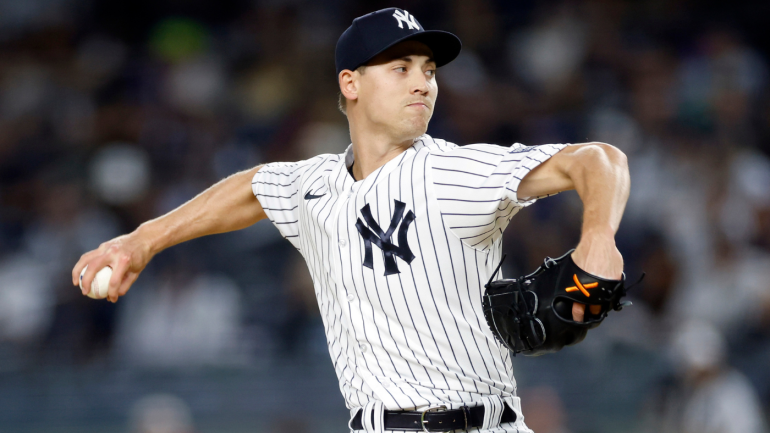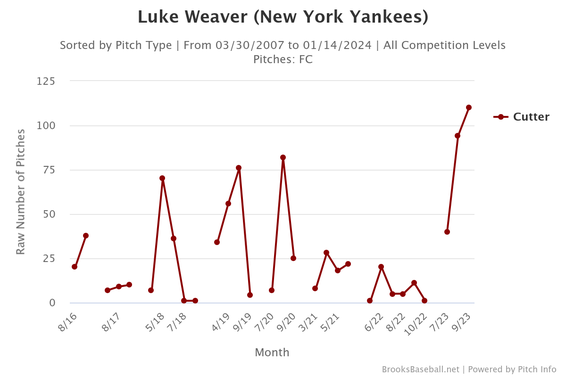
Late last week, the New York Yankees added to their starting rotation in a big way and a small way. The big way is Marcus Stroman. New York signed the 2023 All-Star to a two-year, $37 million contract with a vesting option for a third year. He'll essentially replace Michael King in the rotation after shipping the latter out as the returning headliner in the Juan Soto trade with the San Diego Padres.
The small way is Luke Weaver, no disrespect intended. The 30-year-old right-hander agreed to a one-year contract worth $2 million a few hours before the Stroman signing. There's a $2.5 million club option and bonuses that can push the total value to $8.5 million across two years. A small investment, to be sure, but it was a necessary one for the pitching-needy team in the Bronx.
A year ago, Weaver threw 123 2/3 sub-replacement level innings for the Cincinnati Reds, Seattle Mariners, and the Yankees. New York claimed him off waivers in September and he gave them one good start and two so-so starts. All told, Weaver allowed five runs in 13 innings as a Yankee. That was apparently enough to convince them he was worth bringing back in 2024.
What do the Yankees see in a journeyman who has a lengthy injury history and has pitched for five different teams in the last two seasons? Let's explore.
1. He brought back his cutter
Weaver has primarily worked with a low-to-mid-90s four-seam fastball and a changeup in recent years. He'll also show a breaking ball to keep hitters honest, but the four-seamer/changeup has been his go-to mix. Last July, Weaver brought back his cutter, a pitch he hadn't thrown regularly since 2020. He threw 244 cutters in his final 13 appearances after throwing 233 cutters from 2020-22.

"He's definitely got an interesting mix," Yankees pitching coach Matt Blake said during a YES Network interview last September. "He's kinda evolved over the last few years. He's kind of worked on the cutter lately, and the changeup's always been really good."
By the end of the season, Weaver was throwing mostly four-seamers and cutters, with a few changeups as well. It was a different mix than he featured earlier in the year. The Yankees are betting a modest amount the new mix will allow Weaver to contribute competent innings. It's a $2 million investment. Anything more than competence is a win for the Yankees.
2. He can start or relieve
Weaver made 25 starts last season and also four relief appearances. All four relief outings came with the Mariners in late August and early September, during which Weaver threw two innings, one inning, 2 1/3 innings, and 4 1/3 innings. He pitched in short and long relief, and seamlessly bounced between the rotation and bullpen (and then back to the rotation).
With the caveat that the Yankees could make more additions between now and spring training, their rotation lines up like this:
- RHP Gerrit Cole
- LHP Carlos Rodón
- RHP Marcus Stroman
- LHP Nestor Cortes
- RHP Clarke Schmidt
- RHP Luke Weaver
Weaver is penciled into a swingman role right now. Cortes is coming off a pair of rotator cuff strains and Rodón has a lengthy injury history. If either gets hurt, Weaver will slide into the rotation. And if the Yankees manage to keep everyone on the field, Weaver will assume a long relief role. He's shown he can shift between roles as needed. That versatility is helpful.
3. The Yankees had to replenish depth
To get Soto and Alex Verdugo, the Yankees traded seven pitchers, four of whom pitched in the big leagues last season (King, Jhony Brito, Randy Vásquez, Greg Weissert) and another who figured to be among the first call ups in 2024 (Richard Fitts). They also lost Mitch Spence in the Rule 5 Draft. Spence led the minors in innings last year and was a useful depth piece.
Verdugo and especially Soto were necessary outfield upgrades and the Yankees thinned their pitching reserves to get them. They were able to hang on to top pitching prospect Chase Hampton and Triple-A arms Clayton Beeter and Will Warren, so they didn't completely gut the system, but they did need to replenish that depth. Weaver helps plug an organizational hole on the mound.
It is a thankless job, but a long man who gets irregular work and can give you 2-4 innings when called upon is a necessary part of a pitching staff. It takes a lot -- A LOT -- of arms to get throw 162 games worth of innings. Weaver will soak up innings that were slated for Brito and Vásquez. Put it this way: if New York's season comes down to Weaver's innings, they have much bigger problems.





















